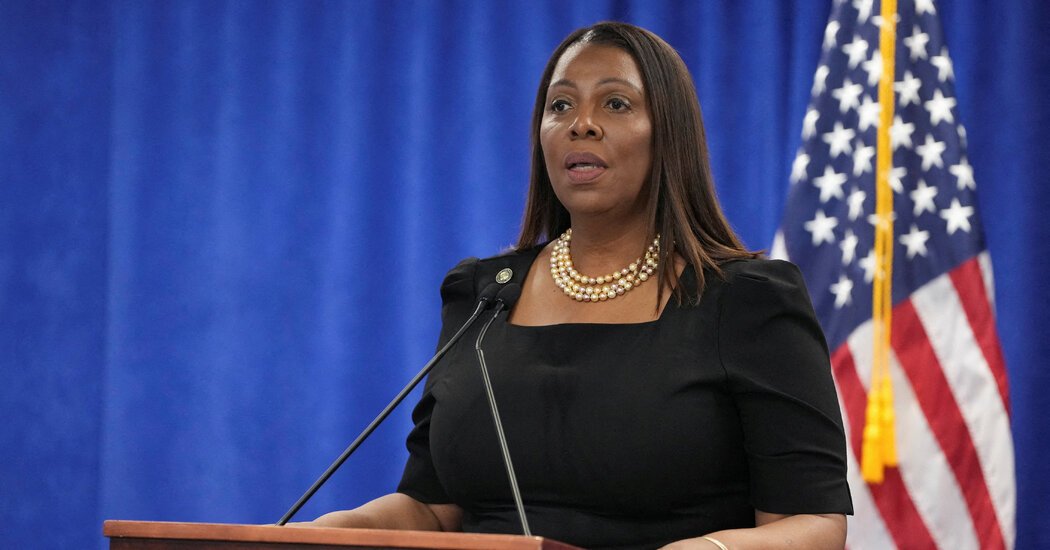As an Amazon Associate, I earn from qualifying purchases.
The New York attorney general, Letitia James, has warned New York hospitals that complying with the White House’s executive order that seeks to end gender-affirming medical care for transgender youth could well violate state law.
The warning, in a letter the attorney general’s office sent Monday morning to health care providers and other organizations, puts hospitals at the center of a conflict between the federal government and state authorities.
Last week, the White House issued an executive order that threatened to withhold federal funding from hospitals that provide gender-affirming treatments — including puberty blockers and hormone treatments — to transgender youth under the age of 19. Within days, NYU Langone, a leading New York City hospital, began canceling appointments for some children, according to two families who spoke to The New York Times.
But the attorney general’s letter warns hospitals that they may risk violating anti-discrimination laws in New York by denying care to pediatric transgender patients.
“Regardless of the availability of federal funding, we write to further remind you of your obligations to comply with New York State laws,” the letter states. It went on, “Electing to refuse services to a class of individuals based on their protected status, such as withholding the availability of services from transgender individuals based on their gender identity or their diagnosis of gender dysphoria, while offering such services to cisgender individuals, is discrimination under New York law.”
NYU Langone has made no announcement about the canceled appointments. A hospital spokesman said he had no immediate comment on the letter.
The executive order last week left many families uncertain about whether their transgender children would be able to receive the medical care and procedures they had anticipated. In interviews, two different families said their 12 -year-olds had been scheduled for a procedure in which a small device that would release Supprelin LA, a puberty-blocking medication, would be implanted in the upper arm. But those appointments were abruptly canceled following the executive order.
In interviews, several parents with transgender children expressed dismay not only at the executive order but also that hospitals in New York City failed to act as bulwarks. They said they had hoped that transgender children in New York would be somewhat insulated from changes in federal policy.
Across the country, more than two dozen states have put restrictions or bans on gender-affirming care for children, according to the Human Rights Campaign. But in New York, some hospitals not only had thriving practices providing gender-affirming care to transgender children but also advertised it prominently online.
The executive order, however, showed just how much leverage the federal government has over hospitals. “It is the policy of the United States that it will not fund, sponsor, promote, assist, or support the so-called ‘transition’ of a child from one sex to another,” the order began. The order threatened to cut federal research funding to force hospitals to stop “the chemical and surgical mutilation of children,” which is how the order describes “gender-affirming care” for youth.
The financial implications are enormous, even for a hospital system as prominent as NYU Langone Health. In one recent year, NYU Langone Health and its researchers at N.Y.U.’s medical school received $815 million in awards from the National Institutes of Health.
The executive order also instructed the federal government to examine whether Medicare or Medicaid could be used to force hospitals to comply.
In a recent 12-month period, NYU Langone made more than $9 billion from patient care. Nearly half that amount — $4.4 billion — was paid through government insurance programs.
The executive order takes specific aim at prescribing puberty blockers, hormone treatment and various surgical procedures for children who experience gender dysphoria, the condition that describes a patient’s distress over the mismatch between gender identity and sex at birth.
Broader questions about medical treatment for young people who are seeking to transition have been the subject of debate in the United States and Europe.
In Europe there has been a pronounced shift that has made some gender-affirming treatments less available to children. Britain recently banned the use of puberty blockers in children under 18 for gender dysphoria, outside of clinical trials.
Puberty blockers have been approved by the F.D.A. for treatment of unusually early onset of puberty, and ailments including prostate cancer and endometriosis. Their use for children with gender dysphoria is considered off-label, although off-label prescriptions of medication are common.
The precise number of children on puberty blockers for gender dysphoria in New York is not clear.
A state senator, Brad Hoylman-Sigal, said that restricting gender-affirming care to youth posed a danger to their health.
“Simply put, this decision could put lives at risk,” the state senator, who represents part of Manhattan, said in a statement. “It is imperative that all New Yorkers, including those under the age of 19, are able to receive necessary and life-preserving gender-affirming care to which they are legally entitled to in the State of New York.”
https://static01.nyt.com/images/2025/02/03/multimedia/03ny-trans-care-vghz/03ny-trans-care-vghz-facebookJumbo.jpg
Discrimination,Hospitals,Transgender,Attorneys General,New York University Langone Medical Center,New York City
#N.Y #Attorney #General #Warns #Hospitals #Canceling #Transgender #Care
Check out this PAGE – https://www.nytimes.com/2025/02/03/nyregion/ny-attorney-general-transgender-care.html
Check out this Page Travel Package discount Must haves – Source2
Disclaimer: As an Amazon Associate, I earn from qualifying purchases; I may earn a commission from qualifying purchases as an affiliate. Please note that I only recommend products I believe will provide value to my readers.




